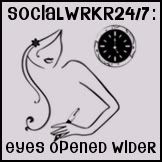When I was in Paris, one of my trip mates asked if I had heard the new Eminem track with Rihanna, Love the way you lie. I had not, so we listened to it on her iPod. As usual with Em’s lyrics, I am transported to a dark place. That man has gone through some tough shit, all of which he isn’t afraid to speak about in public. It is very common knowledge that he has had a serious violent, chaotic and destructive relationship with his ex-wife, Kim, and mother of his daughter, Haley. He has some past songs that speak about her, and one that even kills her. A Twitter friend posted the link to the video for Love the way you lie, and since the song spoke to me, I wanted to check out the video.
Wow.
Some may think this video is glamorizing Domestic Violence. It’s all in the interpretation. I think the video shows just how emotionally and mentally destructive a violent relationship can be. Rihanna’s I love the way you lie lyric has some big controversy around it. I think the point of the lyric is pretty simple: She continues to loves him despite his lies. The line between passion, love and violence can become seriously blurred.
Megan Fox can’t act her way out of a wet paper bag. She relies on her sex appeal, and she definitely has it. However, the moment where she snuffs out the fire and opens her eyes at the camera, is pretty chilling. (I read that she donated her entire fee for this project to a domestic violence shelter. Awesomeness.)
I think it’s just 2 artists, both of who have been involved in partner violence, sharing their souls. Catharsis at its finest.
Just my 2 cents. I’ve never been in a violent relationship, but most of my family has experienced it, over and over. I don’t take this topic lightly, but I can’t speak from experience. I am looking forward to working with victims and their children this school year at my internship. I think it is going to be one hell of an emotional rollercoaster for me, and I think I will learn and witness a lot of hardship and pain, but I do hope that I witness some smiles and success with moving on from the violence.
P.S. The video reminds me of The Burning Bed, which is a tragically sad movie about domestic violence.
Afterthoughts: Don’t let this video fool you into thinking domestic violence only happens to lower class people. It knows no boundaries. And, why is Rihanna half-naked? Weird.











